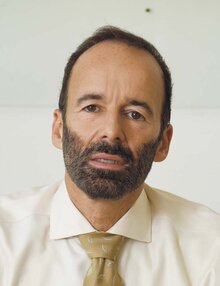
Diversity as an Opportunity

Michael Stuber has been involved in European diversity research and practice since 1997. Prior to this, he helped found the pan-European student organisation AEGEE and establish the Erasmus exchange programme at the Department of Economics at the University of Karlsruhe.

The new Department of Economics and Management building at the Karlsruher Institut für Technologie (KIT), which was established in 2009 when the University of Karlsruhe merged with the Karlsruhe Research Centre.
Mr Stuber, diversity and inclusion are one of the 4 priorities of the Erasmus+ programme generation that has been running since 2021. How do you view the programme’s role in advancing these increasingly important areas?
Michael Stuber: The current Erasmus programme reflects a quite typical approach to diversity and inclusion as it focuses on representation and non-discrimination. This approach is similar to that of many companies today, as it relates to quotas or efforts of improved inclusion of groups who were traditionally disadvantaged (,excluded) or marginalised.
Based on many years of experience in the field of diversity, how do you rate this approach?
It’s a start, actually a great first step towards improving accessibility and increasing the visibility of diversity. However, diversity and inclusion can add much more to Erasmus which in turn can significantly benefit the development of citizens, business managers and future politicians. Diversity, in and of itself, does not automatically create value. Things don’t simply get better because there is more diversity, but because we learn to use it more effectively, we adopt a positive mind-set towards it and manage differences in a productive, constructive and non-violent way. There should be a stronger focus on this aspect in Erasmus+, just as there should in many higher education programmes.
As long as we convey – even if only through the programme’s architecture – that differences create deficits that need to be addressed, we keep perpetuating a mind-set that views diversity as a problem rather than an opportunity. Our goal must be to see diversity as an asset.
Changes of Beliefs as a Consequence of the Stay Abroad
Responses in percent, N = 19,068

How could Erasmus be developed?
One initial step to advance the next Erasmus+ programme generation is to focus more on values education. People should be encouraged to reflect on the dynamics of differences and gain personal insights within new contexts. This could be achieved through interdisciplinary formats, for example.
Another point is that I feel Europe currently lacks a strong branding. There should be a greater emphasis on strengthening a shared European identity, on understanding Europe as a system of values and highlighting its role as an important stabilising factor in the globalised world.
Finally, Erasmus should be leveraged to build more bridges in interdisciplinary and social contexts. For instance, courses or other formats could encourage exchange students establish strong ties with mainstream society in the respective host country.

Let’s finish by taking a look at the impact Erasmus has had and continues to have on many generations of students. What do you consider to be particularly significant?
The opportunity to have international experiences, to develop personally in an intercultural context – in other words, to broaden one’s horizons, experiences and skills in handling differences as well as learning one or even several languages – these are definitely the outstanding aspects of the programme. In the late 1980s and early 1990s, when Erasmus was just getting started, it was not foreseeable that the programme would enable so many millions of people to do all this and shape them in this way. This is quite remarkable, especially considering how much the EU has grown since then.
Erasmus has also played a key role in democratising academic exchange. Previously – in the pre-Erasmus era – going abroad was once the privilege of the academic elite. Today, Erasmus has made this opportunity accessible to much broader segments of the population. A great deal has happened in this respect too, and this is definitely a fantastic development.
Michael Stuber has been closely associated with Erasmus+ since the end of the 1980s.